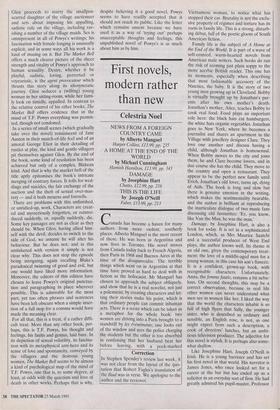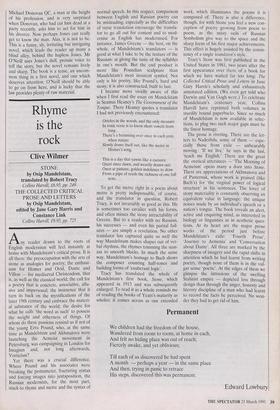First novels, modern rather than new
Celestria Noel
NEWS FROM A FOREIGN COUNTRY CAME by Alberto Manguel Harper Collins, £13.99, pp. 435 A HOME AT THE END OF THE WORLD by Michael Cunningham Hamish Hamilton, £13.99, pp. 343 DAMAGE THIS IS THE LIFE by Joseph O'Neill Faber, £13.99, pp. 213 Canada has become a haven for many authors from more violent, southerly places. Alberto Manguel is the most recent of these. He was born in Argentina and now lives in Toronto. His novel moves from Canada today back to French Algeria, then Paris in 1968 and Buenos Aires at the time of the desaparecidos. The terrible things which went on in Argentina at that time have proved as hard to deal with in fiction as the holocaust. Mr Manguel has chosen to approach the subject obliquely, and show that he is a real novelist, not just a polemicist, by creating characters and let- ting their stories make his point, which is that ordinary people can commit inhuman acts. There is a scene which can be taken as a metaphor for the whole book: two women are driving into a Paris brought to a standstill by les evenements; one looks out of the window and sees the police charging the students but the other is too absorbed in confessing that her husband beat her before leaving, with a pock-marked
Vietnamese woman, to notice what has stopped their car. Brutality is not the exclu- sive property of regimes and torture has its roots in family life. This is a strong, disturb- ing debut, full of the poetic gloom of South American fiction.
Family life is the subject of A Home at the End of the World. It is part of a wave of soft-centred, warm-hearted novels from American male writers. Such books do run the risk of seeming just plain soppy to the more acerbic British reader. This one has its moments, especially when describing that most fashionable accessory of the Nineties, the baby. It is the story of two young men growing up in Cleveland. Bobby is virtually brought up by Jonathan's par- ents after his own mother's death. Jonathan's mother, Alice, teaches Bobby to cook real food. Food plays an important role here: the black hats eat hamburgers, the white hats organic vegetables. Jonathan goes to New York, where he becomes a journalist and shares an apartment in the Village with jewellery designer Clare. They love one another and discuss having a child, although Jonathan is homosexual. When Bobby moves to the city and joins them, he and Clare become lovers, and in due course she has the child. They move to the country and open a restaurant. They appear to be the perfect new family until Erich, Jonathan's old lover, turns up, dying of Aids. The book is long and slow but there is genuine emotion in the writing, which makes the sentimentality bearable, and the author is brilliant at reproducing the inarticulate dialogue of two music fans discussing old favourites: 'Er, you know, like Van the Man, he was the man.'
Damage, by Josephine Hart, is also a book for today. It is set in a sophisticated London, which, as Mrs Maurice Saatchi and a successful producer of West End plays, the author knows well. Its theme is an old one, given the contemporary treat- ment: the love of a middle-aged man for a young woman, in this case his son's fiancée. It is a confident, grown-up book, with recognisable characters. Unfortunately, Anna, the femme fatale, remains a bit nebu- lous. On second thoughts, this may be a correct observation, because in real life other women can never understand what men see in women like her. I liked the way that the world the characters inhabit is so full of high flyers that Sally, the younger sister, who is described as ordinary and sensible, an English rose, is not, as one might expect from such a description, a cook of directors' lunches, but an ambi- tious television producer. The adjective for this novel is stylish. It is perhaps also some- what shallow.
Like Josephine Hart, Joseph O'Neill is Irish. He is a young barrister and has set his first novel in that world. His narrator is James Jones, who once looked set for a career at the bar but has ended up as a solicitor in an everyday sort of firm. He had greatly admired his pupil-master, Professor Michael Donovan QC, a man at the height of his profession, and is very surprised when Donovan, who had cut him dead at a party recently, asks him to act for him in his divorce. Now perhaps Jones can really get to know the man. Alas, it is not to be. This is a funny, sly, irritating but intriguing novel, which leads the reader up many a blind alley, behind the hapless Jones. Mr O'Neill uses Jones's dull, prosaic voice to tell the story, but the novel remains lively and sharp. The book is a tease, an uncom- mon thing in a first novel, and one which deserves attention. O'Neill should be able to go on from here, and is lucky that the law provides plenty of raw material.



























































 Previous page
Previous page